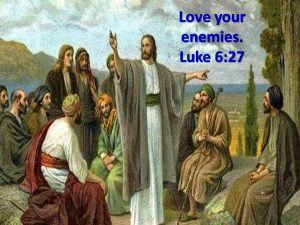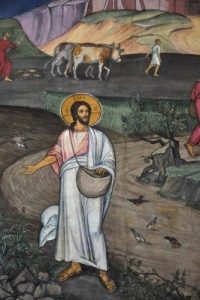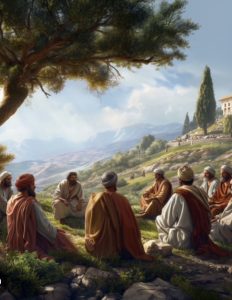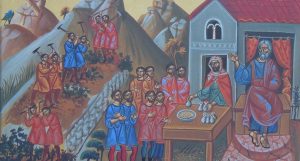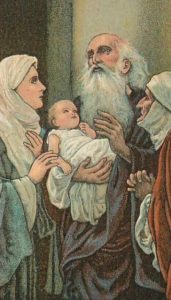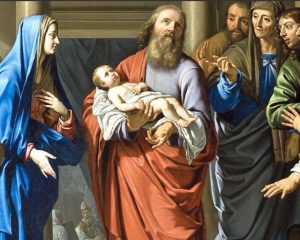- 1 Samuel 26:2, 7-9, 12-13, 22-23
- Psalms 103:1-2, 3-4, 8, 10, 12-13
- 1 Corinthians 15:45-49
- Luke 6:27-38
Today is the 7th Sunday in Ordinary Time, Year C. The very core of our Christian life is to constantly follow the Lord’s teaching of perseverance, forgiveness and love, which ultimately rests on every heart of mankind. We learn many things as we relate ourselves to others, in particular, sharing with our family members, relatives and friends. We mature when there are difficulties and trials, and we frequently find ways to overcome those struggles we are facing in life. Our integrity is best exemplified in moments of testing, even death, but Jesus makes it bearable for us because He saves!
The first reading, taken from the book of Samuel, narrates to us that David is in hiding due to the intention of Saul to kill him. However, when the opportunity comes, one of David’s close aides, Abishai, was about to kill Saul while he was sleeping. David intervened and saved Saul because he was anointed by God. The compassion prevails from the heart of David, not coming from his personal decision, but from God. In reverence to God, David allowed Saul to be freed as the chosen king. David offered Saul a new chance to live showing his mercy and compassion.
The 2nd reading, from the first letter of St. Paul to the Corinthians, gives Paul’s parallel and contrast between Adam and Christ. It states that “the first man Adam became a living being” while Jesus Christ in the New Testament, the last Adam, became a life-giving spirit. Just as we have borne the image of the man of dust coming from earth, in a special way, we are created in the image of Christ, who is the man of heaven.
The gospel taken from St. Luke is kind of a continuation of the evangelist Luke in the sermon on the Beatitudes. Jesus is looking into our eyes saying an important message for us being His newly called disciples. We are warned to keep an eye on our challenging life, having enemies and yet being instructed to love them. I mean challenging due to Jesus’ advice and guidance. This is an invitation to live a new law of Christ.
First, Jesus says, “love your enemies, do good to those who hate you, bless those who curse you and pray for those who mistreat you.” To understand loving your enemies and others, doing good, praying and blessing those who hate you is certainly connected to the last verse of the gospel, which says, “be merciful just as your Father is merciful.” This is Jesus’ challenge to every follower that one needs to embrace a higher standard of action than his social context would normally require.
Second, Jesus says, “Do to others as you have them do to you. For if you love those who love you what credit is that for you?” This is how we must comprehend these words of Jesus to love someone, in terms of action, rather than in terms of emotion. Because to love someone means to “will good to others” as we expect others to do to us. We never will evil upon them, and loving and doing good is the credit we deserve. This is Christ’s positive approach to the golden rule. This is the heart of the message of Christ that we must embrace which demands no expectation of repayment.
Third, Jesus says, “Then your reward will be great, and you will be children of the Most High.” When we listen carefully to Jesus’ words, we are delighted to hear that “reward is great.” The reward cannot be quantified but one can appreciate a good tree by its good and abundant fruits. Our external and interior actions, such as loving, forgiving, blessings and enduring humiliations, would then be products of being children of the Most High, which comes from our transformed hearts. To think of reward is good, but it is not quantifiable, but a result of God’s loving welcome to an eternal bliss.
This is the Goodnews! The Savior is the teacher here, and He instructs us on how to enjoy true happiness now and in that which is to come. We are positioning ourselves for a proper experience of that “joyful season of Lent” which begins this coming Wednesday. God is always laboring upon creation, our creation, to bring us more and more to life.
May we hear these rules of conduct which we are obligated to fulfill for choosing to become disciples of the Lord. This is the reason why many cannot accept Jesus.
Whatever the circumstances, St. Teresa of Avila heard Jesus say to her, “This is how I treat my friends,” to which she replied, “If this is how You treat your friends, it is no wonder You have so few!” Thus, I would say, for those who want to follow the Lord, the demand is great, but the reward is much greater!
God bless you.
Fr. Arlon, osa
——————
El Dictamen del Corazón
Séptimo Domingo del Tiempo Ordinario, Año C
- 1 Samuel 26:2, 7-9, 12-13, 22-23
- Salmos 103:1-2, 3-4, 8, 10, 12-13
- 1 Corintios 15:45-49
- Lucas 6:27-38
Hoy es el Séptimo Domingo del Tiempo Ordinario, Año C. El núcleo mismo de nuestra vida cristiana es seguir constantemente la enseñanza del Señor sobre la perseverancia, el perdón y el amor, los cuales descansan en el corazón de toda la humanidad. Aprendemos muchas cosas mientras nos relacionamos con los demás, en particular, compartiendo con nuestros familiares, parientes y amigos. Maduramos cuando enfrentamos dificultades, pruebas y encontramos maneras de superar las luchas que enfrentamos en la vida. Nuestra integridad se personificamejor en momentos de prueba, incluso en la muerte; Jesús lo hace soportable para nosotros porque ¡Él nos salva!
En nuestra primera lectura tomada del libro de Samuel, nos narra que David está escondido debido a la intención de Saúl de matarlo. Sin embargo, cuando Saúl dormía, uno de sus cercanos, Abisai, quiso matarlo, pero a través de la intervención de David, quien cree que Saúl pertenece a Dios como Su ungido, lo perdonó. David permitió que viviera. La compasión prevalece en el corazón de David, no como una decisión personal, sino como una acción de Dios, quien ha elegido a Saúl como rey. En reverencia a Dios, David permitió que Saúl fuera liberado como rey. ¿Por qué creen que David quiso matar a Saúl? Porque Saúl había lanzado su lanza para matarlo. Saúl sabía que David mataba a sus enemigos y temía que David se convirtiera en rey. Así, Saúl huyó de David, pero Saúl fue acorralado por Abisai; sin embargo, David le dio a Saúl una nueva oportunidad de vivir, manifestando su misericordia y compasión.
En la segunda lectura, de la primera carta de San Pablo a los Corintios, Pablo establece un paralelo y contraste entre Adán y Cristo. Dice que “el primer hombre, Adán, se convirtió en ser viviente”, mientras que Jesús Cristo, en el Nuevo Testamento, el último Adán, se convirtió en un espíritu vivificador. Así como hemos llevado la imagen del hombre de polvo, que viene de la tierra, de una manera especial, hemos sido creados a imagen de Cristo, quien es el hombre del cielo.
El evangelio tomado de San Lucas es una especie de continuación del sermón de las Bienaventuranzas. Jesús nos mira a los ojos y nos da un mensaje importante, sus recién llamados discípulos. Se nos advierte sobre cómo enfrentar la vida desafiante con enemigos y, aun así, se nos instruye a amarlos. Digo desafiante debido al consejo y la guía de Jesús. Esta es una invitación a vivir una nueva ley de Cristo.
Primero, Jesús dice: “Amen a sus enemigos, hagan el bien a los que los odian, bendigan a los que los maldicen y oren por los que los maltratan.” Para entender el amor a nuestros enemigos y a los demás, hacer el bien, orar y bendecir a los que nos odian está ciertamente conectado con el último versículo del evangelio que dice: “Sean misericordiosos, así como su Padre es misericordioso.” Este es el desafío de Jesús para cada seguidor: se necesita abrazar un estándar de acción más alto que el que normalmente requeriría el contexto social.
Segundo, Jesús dice: “Hagan a los demás lo que ustedes quieren que hagan con ustedes. Porque si aman a los que los aman, ¿qué mérito tienen?” Así debemos comprender estas palabras de Jesús: amar a alguien, en términos de acción, más que en términos de emoción. Porque amar a alguien significa “querer el bien para los demás” como esperamos que los demás lo hagan con nosotros. Nunca les haremos mal, amar y hacer el bien es el mérito que merecemos. Este es el enfoque positivo de Cristo hacia la regla de oro. Este es el corazón del mensaje de Cristo que debemos abrazar, que no exige la expectativa de ser retribuido.
Tercero, Jesús dice: “Entonces, su recompensa será grande, y serán hijos del Altísimo.” Cuando escuchamos atentamente las palabras de Jesús, nos deleitamos al oír que “la recompensa será grande.” La recompensa que no puede ser calculada, pero uno puede apreciar un buen árbol por sus buenos y abundantes frutos. Nuestras acciones externas e internas, como el amar, perdonar, bendecir y soportar humillaciones, serán productos de ser hijos del Altísimo, que provienen de nuestros corazones transformados. Pensar en la recompensa es bueno, pero no es calculable; es el resultado de la bienvenida amorosa de Dios hacia una dicha eterna.
¡Esta es la Buena Nueva! El Salvador es el maestro aquí y nos instruye sobre cómo disfrutar de la verdadera felicidad ahora y en el futuro que está por venir. Nos estamos posicionando para una experiencia adecuada de esa “alegría de la temporada de Cuaresma” que comienza este miércoles. Dios siempre está trabajando sobre la creación, nuestra creación, para traernos más y más a la vida.
Que escuchemos estas reglas de conducta que estamos obligados a cumplir por elegir ser discípulos del Señor. Esta es la razón por la que muchos no pueden aceptar a Jesús. Sean cuales sean las circunstancias, Santa Teresa de Ávila escuchó a Jesús decirle: “Así trato a mis amigos,” a lo que ella respondió: “¡Si así tratas a tus amigos, no es de extrañar que tengas tan pocos!” Así que diría, para aquellos que quieren seguir al Señor, la demanda es grande, ¡pero la recompensa es mucho mayor!
Dios los bendiga.
P. Arlon, osa
